Discrimination and Barriers: A Social Studies Report on Disabilities
VerifiedAdded on 2020/09/03
|11
|2812
|52
Report
AI Summary
This social studies report investigates the discrimination faced by people with disabilities, exploring various facets of their experiences. It examines the barriers they encounter in education and employment, highlighting the impact of societal treatment compared to those without disabilities. The report delves into the definition of disabilities, including physical, sensory, and intellectual impairments, and analyzes instances of direct and indirect discrimination. It further discusses the challenges related to financial constraints, healthcare access, and public transport accessibility, referencing specific examples and statistics. The role of organizations like Special Olympics in promoting inclusion and the importance of public transport for daily activities are also addressed. The report concludes by emphasizing the need for equality, participation, and independence for people with disabilities, advocating for improved societal understanding and support.
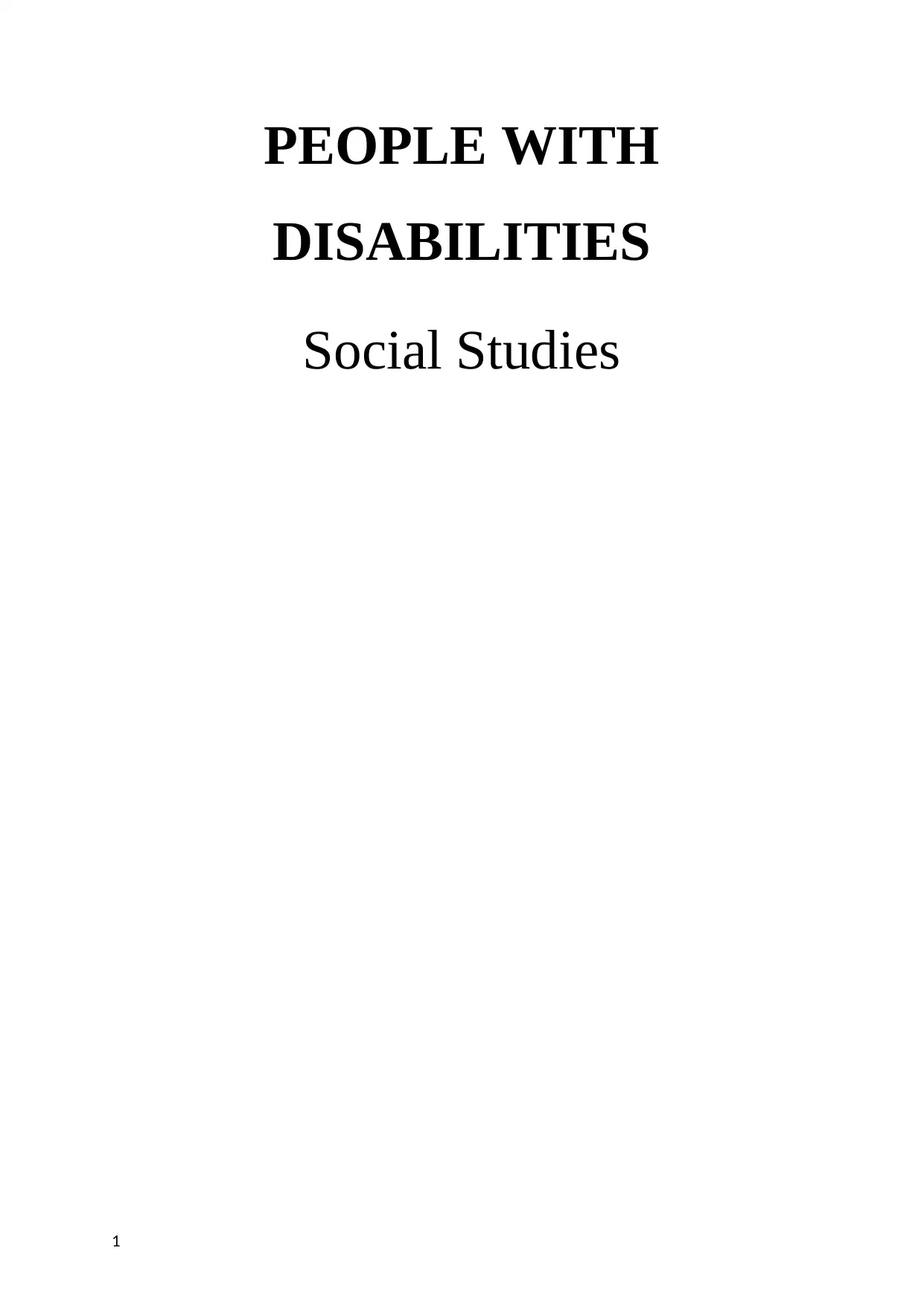
PEOPLE WITH
DISABILITIES
Social Studies
1
DISABILITIES
Social Studies
1
Paraphrase This Document
Need a fresh take? Get an instant paraphrase of this document with our AI Paraphraser
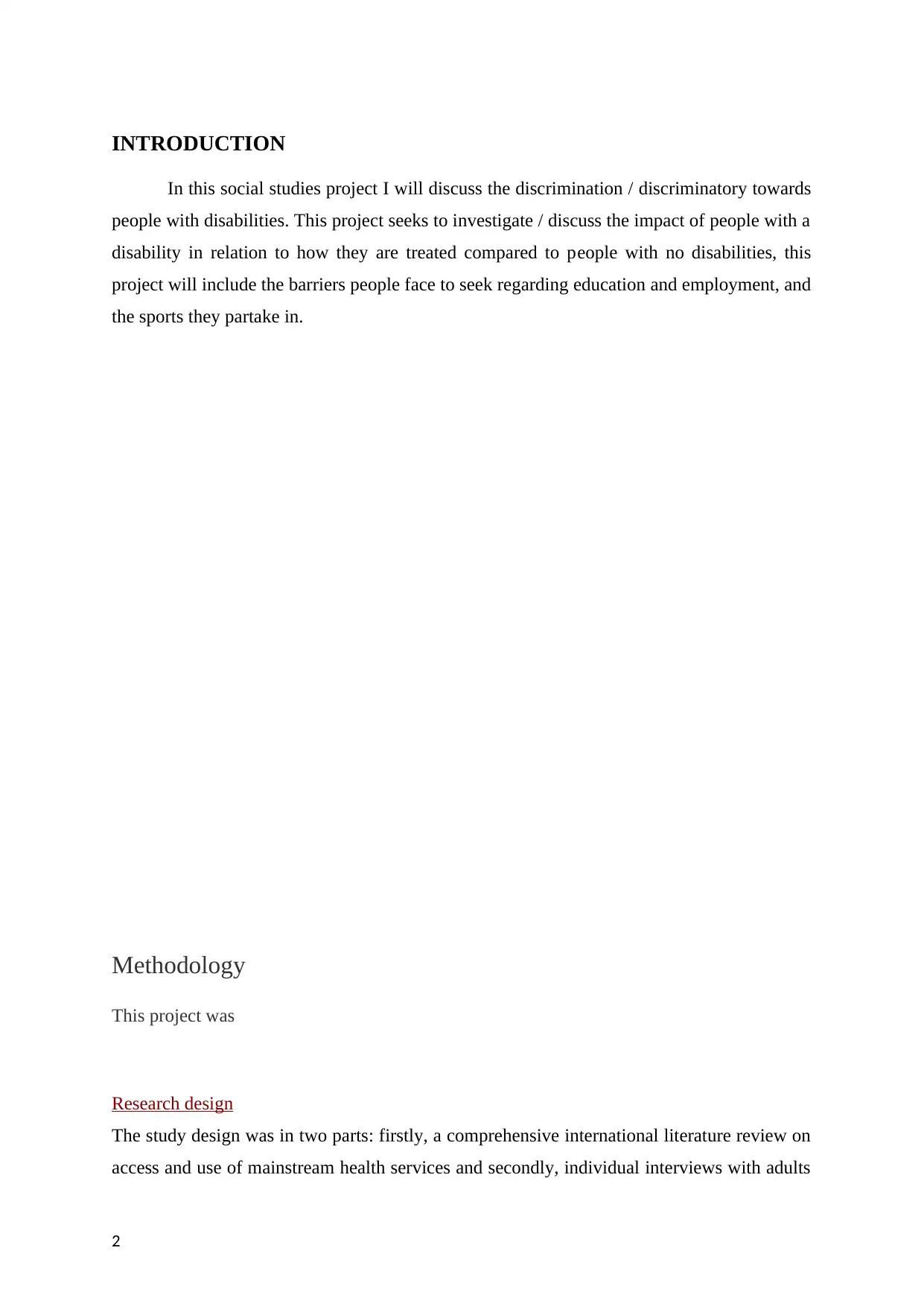
INTRODUCTION
In this social studies project I will discuss the discrimination / discriminatory towards
people with disabilities. This project seeks to investigate / discuss the impact of people with a
disability in relation to how they are treated compared to people with no disabilities, this
project will include the barriers people face to seek regarding education and employment, and
the sports they partake in.
Methodology
This project was
Research design
The study design was in two parts: firstly, a comprehensive international literature review on
access and use of mainstream health services and secondly, individual interviews with adults
2
In this social studies project I will discuss the discrimination / discriminatory towards
people with disabilities. This project seeks to investigate / discuss the impact of people with a
disability in relation to how they are treated compared to people with no disabilities, this
project will include the barriers people face to seek regarding education and employment, and
the sports they partake in.
Methodology
This project was
Research design
The study design was in two parts: firstly, a comprehensive international literature review on
access and use of mainstream health services and secondly, individual interviews with adults
2
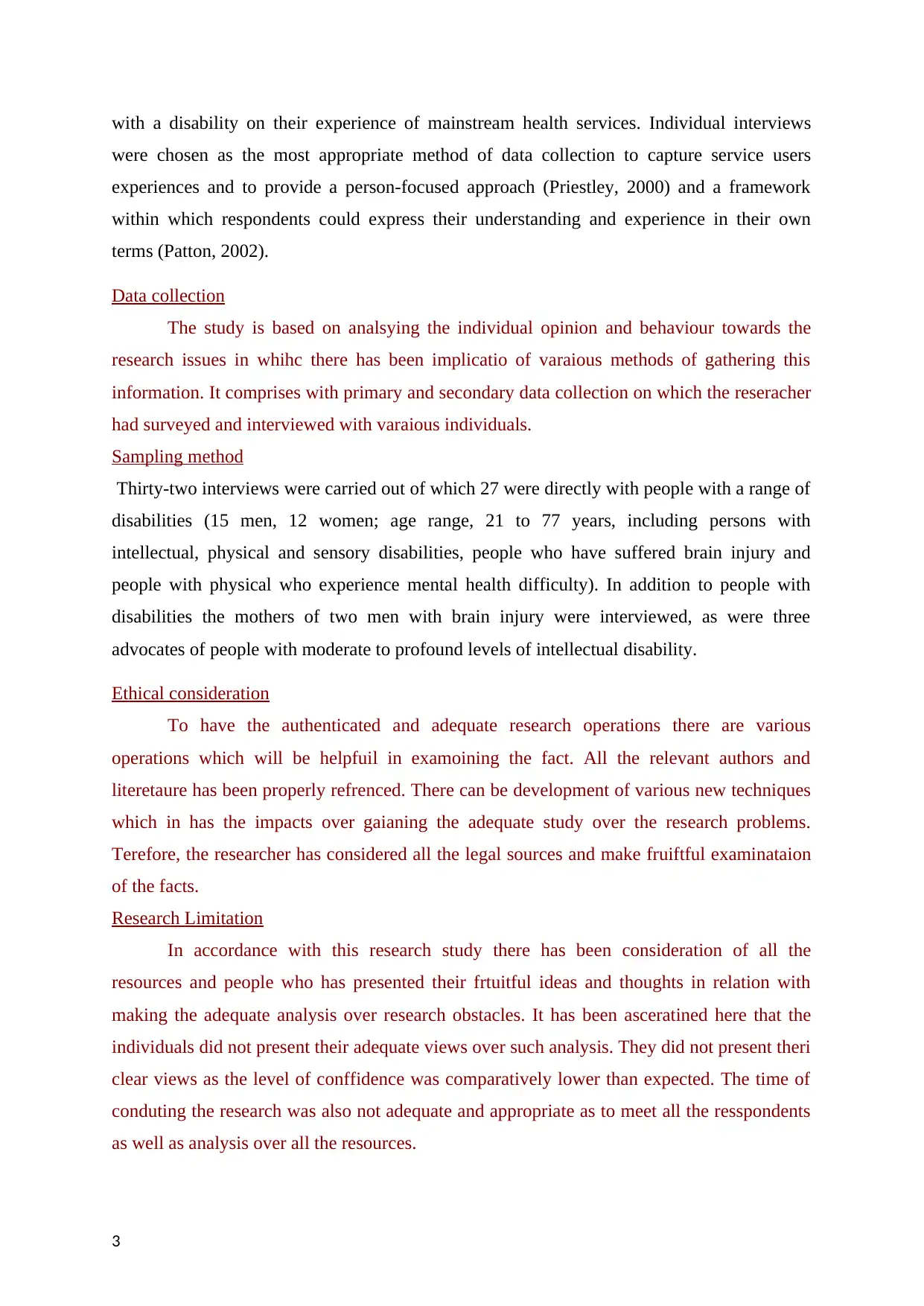
with a disability on their experience of mainstream health services. Individual interviews
were chosen as the most appropriate method of data collection to capture service users
experiences and to provide a person-focused approach (Priestley, 2000) and a framework
within which respondents could express their understanding and experience in their own
terms (Patton, 2002).
Data collection
The study is based on analsying the individual opinion and behaviour towards the
research issues in whihc there has been implicatio of varaious methods of gathering this
information. It comprises with primary and secondary data collection on which the reseracher
had surveyed and interviewed with varaious individuals.
Sampling method
Thirty-two interviews were carried out of which 27 were directly with people with a range of
disabilities (15 men, 12 women; age range, 21 to 77 years, including persons with
intellectual, physical and sensory disabilities, people who have suffered brain injury and
people with physical who experience mental health difficulty). In addition to people with
disabilities the mothers of two men with brain injury were interviewed, as were three
advocates of people with moderate to profound levels of intellectual disability.
Ethical consideration
To have the authenticated and adequate research operations there are various
operations which will be helpfuil in examoining the fact. All the relevant authors and
literetaure has been properly refrenced. There can be development of various new techniques
which in has the impacts over gaianing the adequate study over the research problems.
Terefore, the researcher has considered all the legal sources and make fruiftful examinataion
of the facts.
Research Limitation
In accordance with this research study there has been consideration of all the
resources and people who has presented their frtuitful ideas and thoughts in relation with
making the adequate analysis over research obstacles. It has been asceratined here that the
individuals did not present their adequate views over such analysis. They did not present theri
clear views as the level of conffidence was comparatively lower than expected. The time of
conduting the research was also not adequate and appropriate as to meet all the resspondents
as well as analysis over all the resources.
3
were chosen as the most appropriate method of data collection to capture service users
experiences and to provide a person-focused approach (Priestley, 2000) and a framework
within which respondents could express their understanding and experience in their own
terms (Patton, 2002).
Data collection
The study is based on analsying the individual opinion and behaviour towards the
research issues in whihc there has been implicatio of varaious methods of gathering this
information. It comprises with primary and secondary data collection on which the reseracher
had surveyed and interviewed with varaious individuals.
Sampling method
Thirty-two interviews were carried out of which 27 were directly with people with a range of
disabilities (15 men, 12 women; age range, 21 to 77 years, including persons with
intellectual, physical and sensory disabilities, people who have suffered brain injury and
people with physical who experience mental health difficulty). In addition to people with
disabilities the mothers of two men with brain injury were interviewed, as were three
advocates of people with moderate to profound levels of intellectual disability.
Ethical consideration
To have the authenticated and adequate research operations there are various
operations which will be helpfuil in examoining the fact. All the relevant authors and
literetaure has been properly refrenced. There can be development of various new techniques
which in has the impacts over gaianing the adequate study over the research problems.
Terefore, the researcher has considered all the legal sources and make fruiftful examinataion
of the facts.
Research Limitation
In accordance with this research study there has been consideration of all the
resources and people who has presented their frtuitful ideas and thoughts in relation with
making the adequate analysis over research obstacles. It has been asceratined here that the
individuals did not present their adequate views over such analysis. They did not present theri
clear views as the level of conffidence was comparatively lower than expected. The time of
conduting the research was also not adequate and appropriate as to meet all the resspondents
as well as analysis over all the resources.
3
⊘ This is a preview!⊘
Do you want full access?
Subscribe today to unlock all pages.

Trusted by 1+ million students worldwide
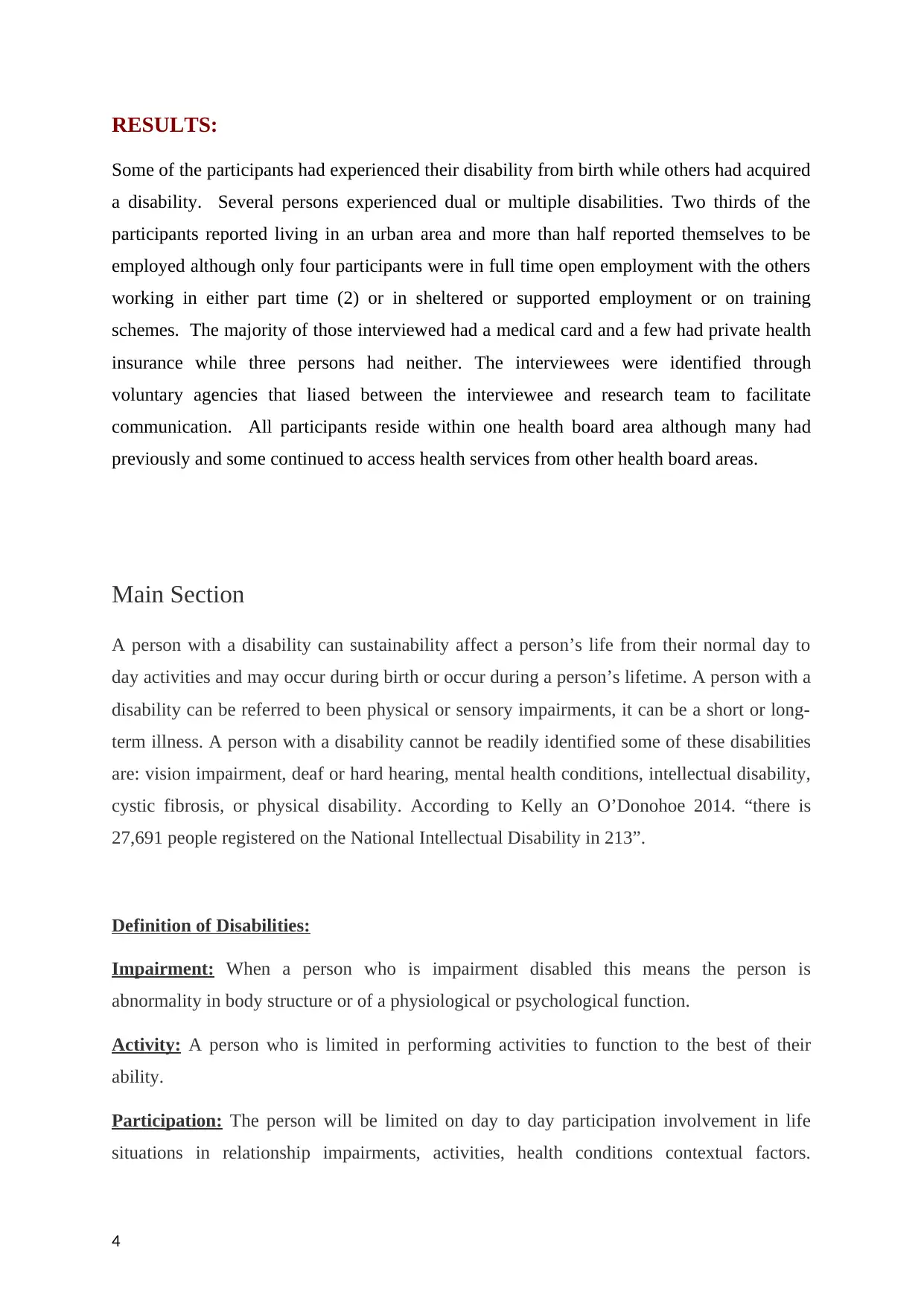
RESULTS:
Some of the participants had experienced their disability from birth while others had acquired
a disability. Several persons experienced dual or multiple disabilities. Two thirds of the
participants reported living in an urban area and more than half reported themselves to be
employed although only four participants were in full time open employment with the others
working in either part time (2) or in sheltered or supported employment or on training
schemes. The majority of those interviewed had a medical card and a few had private health
insurance while three persons had neither. The interviewees were identified through
voluntary agencies that liased between the interviewee and research team to facilitate
communication. All participants reside within one health board area although many had
previously and some continued to access health services from other health board areas.
Main Section
A person with a disability can sustainability affect a person’s life from their normal day to
day activities and may occur during birth or occur during a person’s lifetime. A person with a
disability can be referred to been physical or sensory impairments, it can be a short or long-
term illness. A person with a disability cannot be readily identified some of these disabilities
are: vision impairment, deaf or hard hearing, mental health conditions, intellectual disability,
cystic fibrosis, or physical disability. According to Kelly an O’Donohoe 2014. “there is
27,691 people registered on the National Intellectual Disability in 213”.
Definition of Disabilities:
Impairment: When a person who is impairment disabled this means the person is
abnormality in body structure or of a physiological or psychological function.
Activity: A person who is limited in performing activities to function to the best of their
ability.
Participation: The person will be limited on day to day participation involvement in life
situations in relationship impairments, activities, health conditions contextual factors.
4
Some of the participants had experienced their disability from birth while others had acquired
a disability. Several persons experienced dual or multiple disabilities. Two thirds of the
participants reported living in an urban area and more than half reported themselves to be
employed although only four participants were in full time open employment with the others
working in either part time (2) or in sheltered or supported employment or on training
schemes. The majority of those interviewed had a medical card and a few had private health
insurance while three persons had neither. The interviewees were identified through
voluntary agencies that liased between the interviewee and research team to facilitate
communication. All participants reside within one health board area although many had
previously and some continued to access health services from other health board areas.
Main Section
A person with a disability can sustainability affect a person’s life from their normal day to
day activities and may occur during birth or occur during a person’s lifetime. A person with a
disability can be referred to been physical or sensory impairments, it can be a short or long-
term illness. A person with a disability cannot be readily identified some of these disabilities
are: vision impairment, deaf or hard hearing, mental health conditions, intellectual disability,
cystic fibrosis, or physical disability. According to Kelly an O’Donohoe 2014. “there is
27,691 people registered on the National Intellectual Disability in 213”.
Definition of Disabilities:
Impairment: When a person who is impairment disabled this means the person is
abnormality in body structure or of a physiological or psychological function.
Activity: A person who is limited in performing activities to function to the best of their
ability.
Participation: The person will be limited on day to day participation involvement in life
situations in relationship impairments, activities, health conditions contextual factors.
4
Paraphrase This Document
Need a fresh take? Get an instant paraphrase of this document with our AI Paraphraser
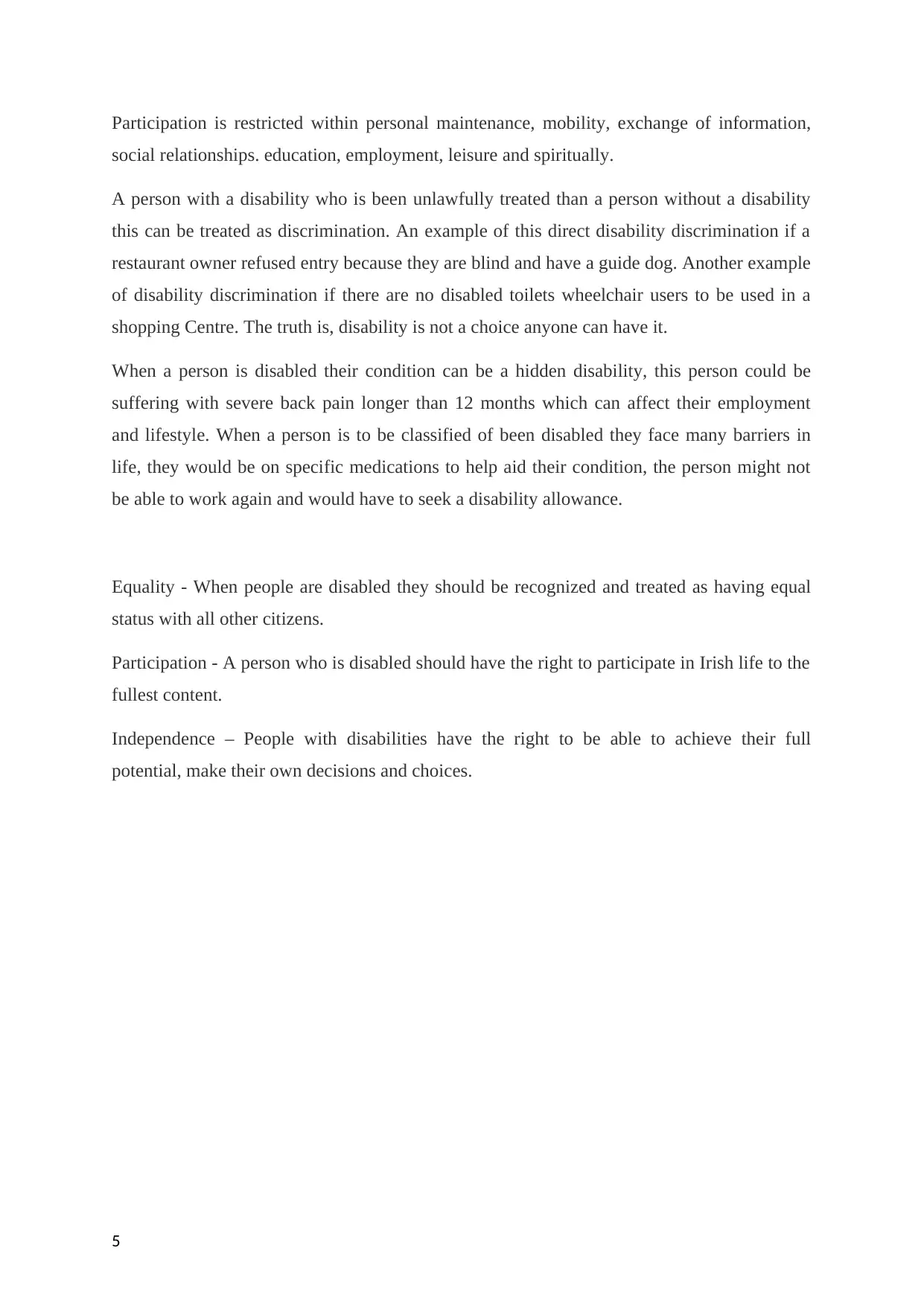
Participation is restricted within personal maintenance, mobility, exchange of information,
social relationships. education, employment, leisure and spiritually.
A person with a disability who is been unlawfully treated than a person without a disability
this can be treated as discrimination. An example of this direct disability discrimination if a
restaurant owner refused entry because they are blind and have a guide dog. Another example
of disability discrimination if there are no disabled toilets wheelchair users to be used in a
shopping Centre. The truth is, disability is not a choice anyone can have it.
When a person is disabled their condition can be a hidden disability, this person could be
suffering with severe back pain longer than 12 months which can affect their employment
and lifestyle. When a person is to be classified of been disabled they face many barriers in
life, they would be on specific medications to help aid their condition, the person might not
be able to work again and would have to seek a disability allowance.
Equality - When people are disabled they should be recognized and treated as having equal
status with all other citizens.
Participation - A person who is disabled should have the right to participate in Irish life to the
fullest content.
Independence – People with disabilities have the right to be able to achieve their full
potential, make their own decisions and choices.
5
social relationships. education, employment, leisure and spiritually.
A person with a disability who is been unlawfully treated than a person without a disability
this can be treated as discrimination. An example of this direct disability discrimination if a
restaurant owner refused entry because they are blind and have a guide dog. Another example
of disability discrimination if there are no disabled toilets wheelchair users to be used in a
shopping Centre. The truth is, disability is not a choice anyone can have it.
When a person is disabled their condition can be a hidden disability, this person could be
suffering with severe back pain longer than 12 months which can affect their employment
and lifestyle. When a person is to be classified of been disabled they face many barriers in
life, they would be on specific medications to help aid their condition, the person might not
be able to work again and would have to seek a disability allowance.
Equality - When people are disabled they should be recognized and treated as having equal
status with all other citizens.
Participation - A person who is disabled should have the right to participate in Irish life to the
fullest content.
Independence – People with disabilities have the right to be able to achieve their full
potential, make their own decisions and choices.
5
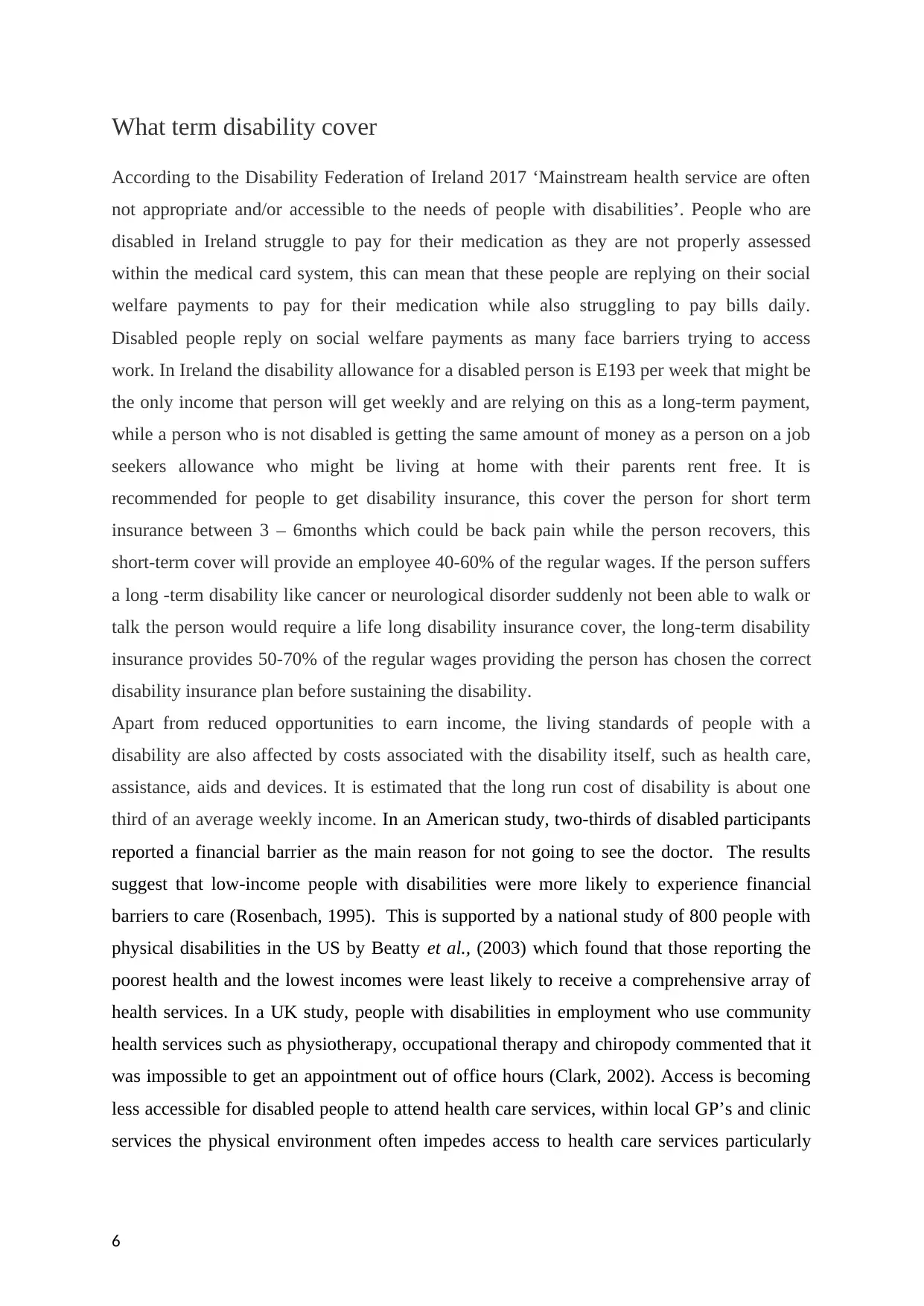
What term disability cover
According to the Disability Federation of Ireland 2017 ‘Mainstream health service are often
not appropriate and/or accessible to the needs of people with disabilities’. People who are
disabled in Ireland struggle to pay for their medication as they are not properly assessed
within the medical card system, this can mean that these people are replying on their social
welfare payments to pay for their medication while also struggling to pay bills daily.
Disabled people reply on social welfare payments as many face barriers trying to access
work. In Ireland the disability allowance for a disabled person is E193 per week that might be
the only income that person will get weekly and are relying on this as a long-term payment,
while a person who is not disabled is getting the same amount of money as a person on a job
seekers allowance who might be living at home with their parents rent free. It is
recommended for people to get disability insurance, this cover the person for short term
insurance between 3 – 6months which could be back pain while the person recovers, this
short-term cover will provide an employee 40-60% of the regular wages. If the person suffers
a long -term disability like cancer or neurological disorder suddenly not been able to walk or
talk the person would require a life long disability insurance cover, the long-term disability
insurance provides 50-70% of the regular wages providing the person has chosen the correct
disability insurance plan before sustaining the disability.
Apart from reduced opportunities to earn income, the living standards of people with a
disability are also affected by costs associated with the disability itself, such as health care,
assistance, aids and devices. It is estimated that the long run cost of disability is about one
third of an average weekly income. In an American study, two-thirds of disabled participants
reported a financial barrier as the main reason for not going to see the doctor. The results
suggest that low-income people with disabilities were more likely to experience financial
barriers to care (Rosenbach, 1995). This is supported by a national study of 800 people with
physical disabilities in the US by Beatty et al., (2003) which found that those reporting the
poorest health and the lowest incomes were least likely to receive a comprehensive array of
health services. In a UK study, people with disabilities in employment who use community
health services such as physiotherapy, occupational therapy and chiropody commented that it
was impossible to get an appointment out of office hours (Clark, 2002). Access is becoming
less accessible for disabled people to attend health care services, within local GP’s and clinic
services the physical environment often impedes access to health care services particularly
6
According to the Disability Federation of Ireland 2017 ‘Mainstream health service are often
not appropriate and/or accessible to the needs of people with disabilities’. People who are
disabled in Ireland struggle to pay for their medication as they are not properly assessed
within the medical card system, this can mean that these people are replying on their social
welfare payments to pay for their medication while also struggling to pay bills daily.
Disabled people reply on social welfare payments as many face barriers trying to access
work. In Ireland the disability allowance for a disabled person is E193 per week that might be
the only income that person will get weekly and are relying on this as a long-term payment,
while a person who is not disabled is getting the same amount of money as a person on a job
seekers allowance who might be living at home with their parents rent free. It is
recommended for people to get disability insurance, this cover the person for short term
insurance between 3 – 6months which could be back pain while the person recovers, this
short-term cover will provide an employee 40-60% of the regular wages. If the person suffers
a long -term disability like cancer or neurological disorder suddenly not been able to walk or
talk the person would require a life long disability insurance cover, the long-term disability
insurance provides 50-70% of the regular wages providing the person has chosen the correct
disability insurance plan before sustaining the disability.
Apart from reduced opportunities to earn income, the living standards of people with a
disability are also affected by costs associated with the disability itself, such as health care,
assistance, aids and devices. It is estimated that the long run cost of disability is about one
third of an average weekly income. In an American study, two-thirds of disabled participants
reported a financial barrier as the main reason for not going to see the doctor. The results
suggest that low-income people with disabilities were more likely to experience financial
barriers to care (Rosenbach, 1995). This is supported by a national study of 800 people with
physical disabilities in the US by Beatty et al., (2003) which found that those reporting the
poorest health and the lowest incomes were least likely to receive a comprehensive array of
health services. In a UK study, people with disabilities in employment who use community
health services such as physiotherapy, occupational therapy and chiropody commented that it
was impossible to get an appointment out of office hours (Clark, 2002). Access is becoming
less accessible for disabled people to attend health care services, within local GP’s and clinic
services the physical environment often impedes access to health care services particularly
6
⊘ This is a preview!⊘
Do you want full access?
Subscribe today to unlock all pages.

Trusted by 1+ million students worldwide
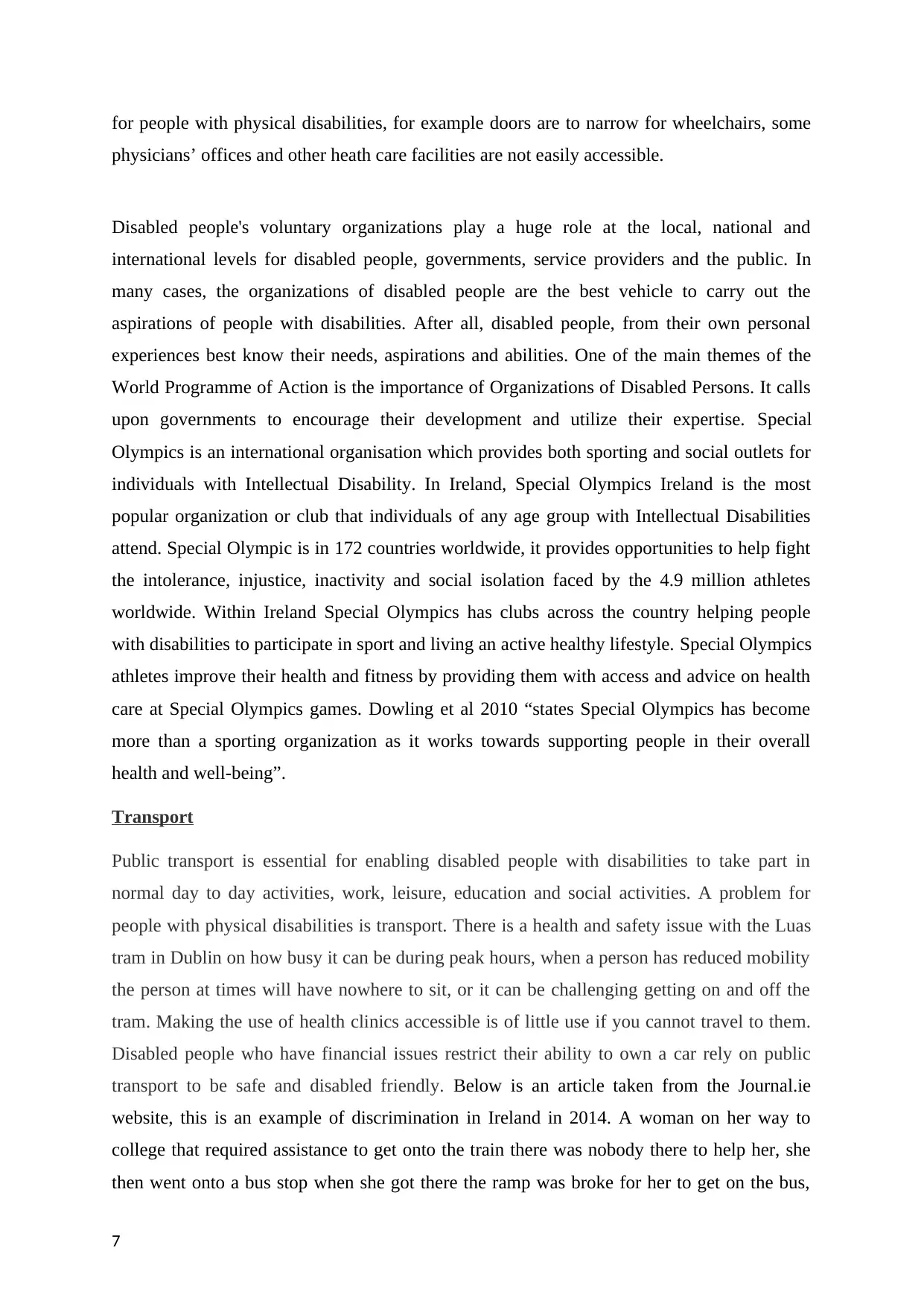
for people with physical disabilities, for example doors are to narrow for wheelchairs, some
physicians’ offices and other heath care facilities are not easily accessible.
Disabled people's voluntary organizations play a huge role at the local, national and
international levels for disabled people, governments, service providers and the public. In
many cases, the organizations of disabled people are the best vehicle to carry out the
aspirations of people with disabilities. After all, disabled people, from their own personal
experiences best know their needs, aspirations and abilities. One of the main themes of the
World Programme of Action is the importance of Organizations of Disabled Persons. It calls
upon governments to encourage their development and utilize their expertise. Special
Olympics is an international organisation which provides both sporting and social outlets for
individuals with Intellectual Disability. In Ireland, Special Olympics Ireland is the most
popular organization or club that individuals of any age group with Intellectual Disabilities
attend. Special Olympic is in 172 countries worldwide, it provides opportunities to help fight
the intolerance, injustice, inactivity and social isolation faced by the 4.9 million athletes
worldwide. Within Ireland Special Olympics has clubs across the country helping people
with disabilities to participate in sport and living an active healthy lifestyle. Special Olympics
athletes improve their health and fitness by providing them with access and advice on health
care at Special Olympics games. Dowling et al 2010 “states Special Olympics has become
more than a sporting organization as it works towards supporting people in their overall
health and well-being”.
Transport
Public transport is essential for enabling disabled people with disabilities to take part in
normal day to day activities, work, leisure, education and social activities. A problem for
people with physical disabilities is transport. There is a health and safety issue with the Luas
tram in Dublin on how busy it can be during peak hours, when a person has reduced mobility
the person at times will have nowhere to sit, or it can be challenging getting on and off the
tram. Making the use of health clinics accessible is of little use if you cannot travel to them.
Disabled people who have financial issues restrict their ability to own a car rely on public
transport to be safe and disabled friendly. Below is an article taken from the Journal.ie
website, this is an example of discrimination in Ireland in 2014. A woman on her way to
college that required assistance to get onto the train there was nobody there to help her, she
then went onto a bus stop when she got there the ramp was broke for her to get on the bus,
7
physicians’ offices and other heath care facilities are not easily accessible.
Disabled people's voluntary organizations play a huge role at the local, national and
international levels for disabled people, governments, service providers and the public. In
many cases, the organizations of disabled people are the best vehicle to carry out the
aspirations of people with disabilities. After all, disabled people, from their own personal
experiences best know their needs, aspirations and abilities. One of the main themes of the
World Programme of Action is the importance of Organizations of Disabled Persons. It calls
upon governments to encourage their development and utilize their expertise. Special
Olympics is an international organisation which provides both sporting and social outlets for
individuals with Intellectual Disability. In Ireland, Special Olympics Ireland is the most
popular organization or club that individuals of any age group with Intellectual Disabilities
attend. Special Olympic is in 172 countries worldwide, it provides opportunities to help fight
the intolerance, injustice, inactivity and social isolation faced by the 4.9 million athletes
worldwide. Within Ireland Special Olympics has clubs across the country helping people
with disabilities to participate in sport and living an active healthy lifestyle. Special Olympics
athletes improve their health and fitness by providing them with access and advice on health
care at Special Olympics games. Dowling et al 2010 “states Special Olympics has become
more than a sporting organization as it works towards supporting people in their overall
health and well-being”.
Transport
Public transport is essential for enabling disabled people with disabilities to take part in
normal day to day activities, work, leisure, education and social activities. A problem for
people with physical disabilities is transport. There is a health and safety issue with the Luas
tram in Dublin on how busy it can be during peak hours, when a person has reduced mobility
the person at times will have nowhere to sit, or it can be challenging getting on and off the
tram. Making the use of health clinics accessible is of little use if you cannot travel to them.
Disabled people who have financial issues restrict their ability to own a car rely on public
transport to be safe and disabled friendly. Below is an article taken from the Journal.ie
website, this is an example of discrimination in Ireland in 2014. A woman on her way to
college that required assistance to get onto the train there was nobody there to help her, she
then went onto a bus stop when she got there the ramp was broke for her to get on the bus,
7
Paraphrase This Document
Need a fresh take? Get an instant paraphrase of this document with our AI Paraphraser
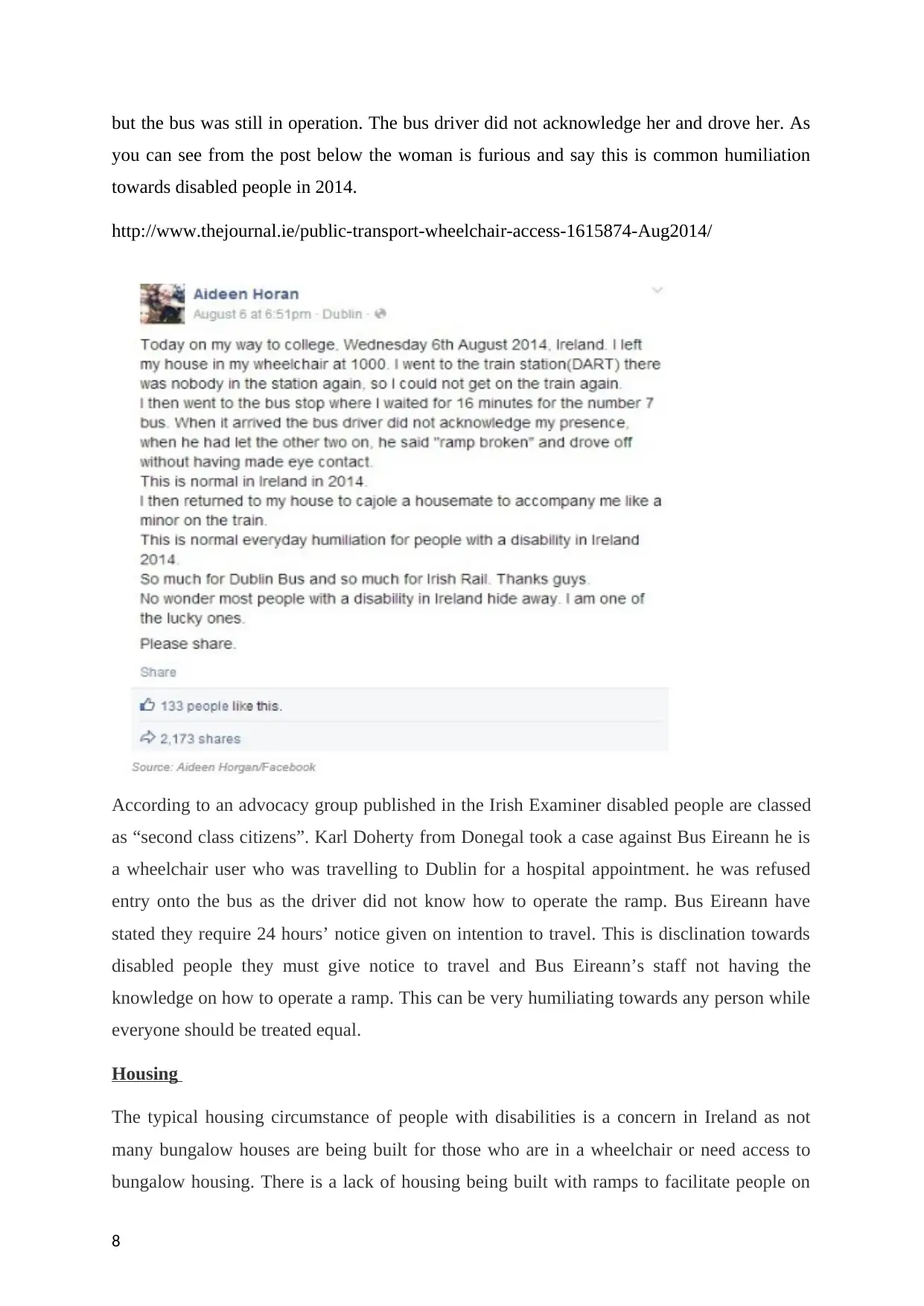
but the bus was still in operation. The bus driver did not acknowledge her and drove her. As
you can see from the post below the woman is furious and say this is common humiliation
towards disabled people in 2014.
http://www.thejournal.ie/public-transport-wheelchair-access-1615874-Aug2014/
According to an advocacy group published in the Irish Examiner disabled people are classed
as “second class citizens”. Karl Doherty from Donegal took a case against Bus Eireann he is
a wheelchair user who was travelling to Dublin for a hospital appointment. he was refused
entry onto the bus as the driver did not know how to operate the ramp. Bus Eireann have
stated they require 24 hours’ notice given on intention to travel. This is disclination towards
disabled people they must give notice to travel and Bus Eireann’s staff not having the
knowledge on how to operate a ramp. This can be very humiliating towards any person while
everyone should be treated equal.
Housing
The typical housing circumstance of people with disabilities is a concern in Ireland as not
many bungalow houses are being built for those who are in a wheelchair or need access to
bungalow housing. There is a lack of housing being built with ramps to facilitate people on
8
you can see from the post below the woman is furious and say this is common humiliation
towards disabled people in 2014.
http://www.thejournal.ie/public-transport-wheelchair-access-1615874-Aug2014/
According to an advocacy group published in the Irish Examiner disabled people are classed
as “second class citizens”. Karl Doherty from Donegal took a case against Bus Eireann he is
a wheelchair user who was travelling to Dublin for a hospital appointment. he was refused
entry onto the bus as the driver did not know how to operate the ramp. Bus Eireann have
stated they require 24 hours’ notice given on intention to travel. This is disclination towards
disabled people they must give notice to travel and Bus Eireann’s staff not having the
knowledge on how to operate a ramp. This can be very humiliating towards any person while
everyone should be treated equal.
Housing
The typical housing circumstance of people with disabilities is a concern in Ireland as not
many bungalow houses are being built for those who are in a wheelchair or need access to
bungalow housing. There is a lack of housing being built with ramps to facilitate people on
8
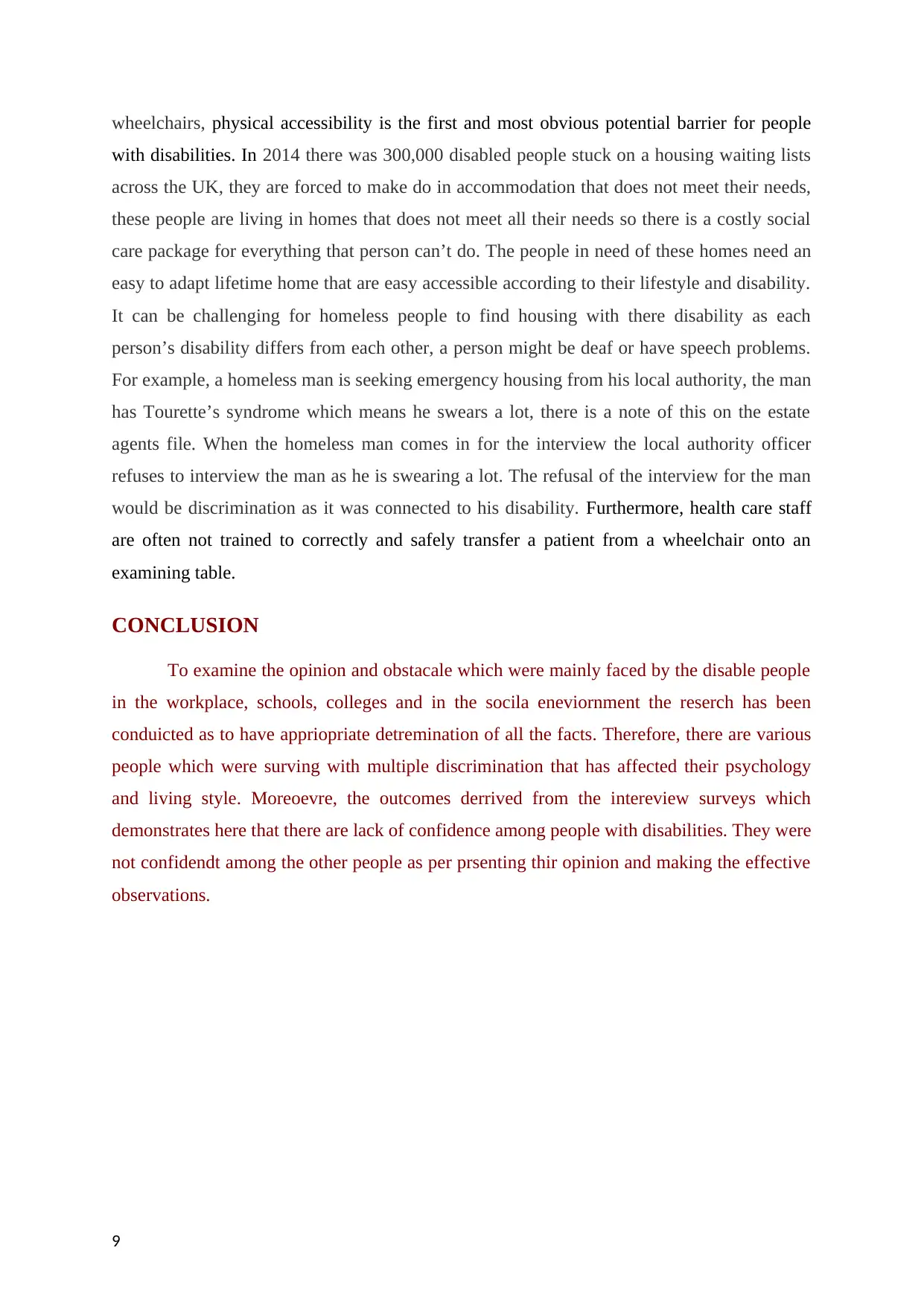
wheelchairs, physical accessibility is the first and most obvious potential barrier for people
with disabilities. In 2014 there was 300,000 disabled people stuck on a housing waiting lists
across the UK, they are forced to make do in accommodation that does not meet their needs,
these people are living in homes that does not meet all their needs so there is a costly social
care package for everything that person can’t do. The people in need of these homes need an
easy to adapt lifetime home that are easy accessible according to their lifestyle and disability.
It can be challenging for homeless people to find housing with there disability as each
person’s disability differs from each other, a person might be deaf or have speech problems.
For example, a homeless man is seeking emergency housing from his local authority, the man
has Tourette’s syndrome which means he swears a lot, there is a note of this on the estate
agents file. When the homeless man comes in for the interview the local authority officer
refuses to interview the man as he is swearing a lot. The refusal of the interview for the man
would be discrimination as it was connected to his disability. Furthermore, health care staff
are often not trained to correctly and safely transfer a patient from a wheelchair onto an
examining table.
CONCLUSION
To examine the opinion and obstacale which were mainly faced by the disable people
in the workplace, schools, colleges and in the socila eneviornment the reserch has been
conduicted as to have appriopriate detremination of all the facts. Therefore, there are various
people which were surving with multiple discrimination that has affected their psychology
and living style. Moreoevre, the outcomes derrived from the intereview surveys which
demonstrates here that there are lack of confidence among people with disabilities. They were
not confidendt among the other people as per prsenting thir opinion and making the effective
observations.
9
with disabilities. In 2014 there was 300,000 disabled people stuck on a housing waiting lists
across the UK, they are forced to make do in accommodation that does not meet their needs,
these people are living in homes that does not meet all their needs so there is a costly social
care package for everything that person can’t do. The people in need of these homes need an
easy to adapt lifetime home that are easy accessible according to their lifestyle and disability.
It can be challenging for homeless people to find housing with there disability as each
person’s disability differs from each other, a person might be deaf or have speech problems.
For example, a homeless man is seeking emergency housing from his local authority, the man
has Tourette’s syndrome which means he swears a lot, there is a note of this on the estate
agents file. When the homeless man comes in for the interview the local authority officer
refuses to interview the man as he is swearing a lot. The refusal of the interview for the man
would be discrimination as it was connected to his disability. Furthermore, health care staff
are often not trained to correctly and safely transfer a patient from a wheelchair onto an
examining table.
CONCLUSION
To examine the opinion and obstacale which were mainly faced by the disable people
in the workplace, schools, colleges and in the socila eneviornment the reserch has been
conduicted as to have appriopriate detremination of all the facts. Therefore, there are various
people which were surving with multiple discrimination that has affected their psychology
and living style. Moreoevre, the outcomes derrived from the intereview surveys which
demonstrates here that there are lack of confidence among people with disabilities. They were
not confidendt among the other people as per prsenting thir opinion and making the effective
observations.
9
⊘ This is a preview!⊘
Do you want full access?
Subscribe today to unlock all pages.

Trusted by 1+ million students worldwide
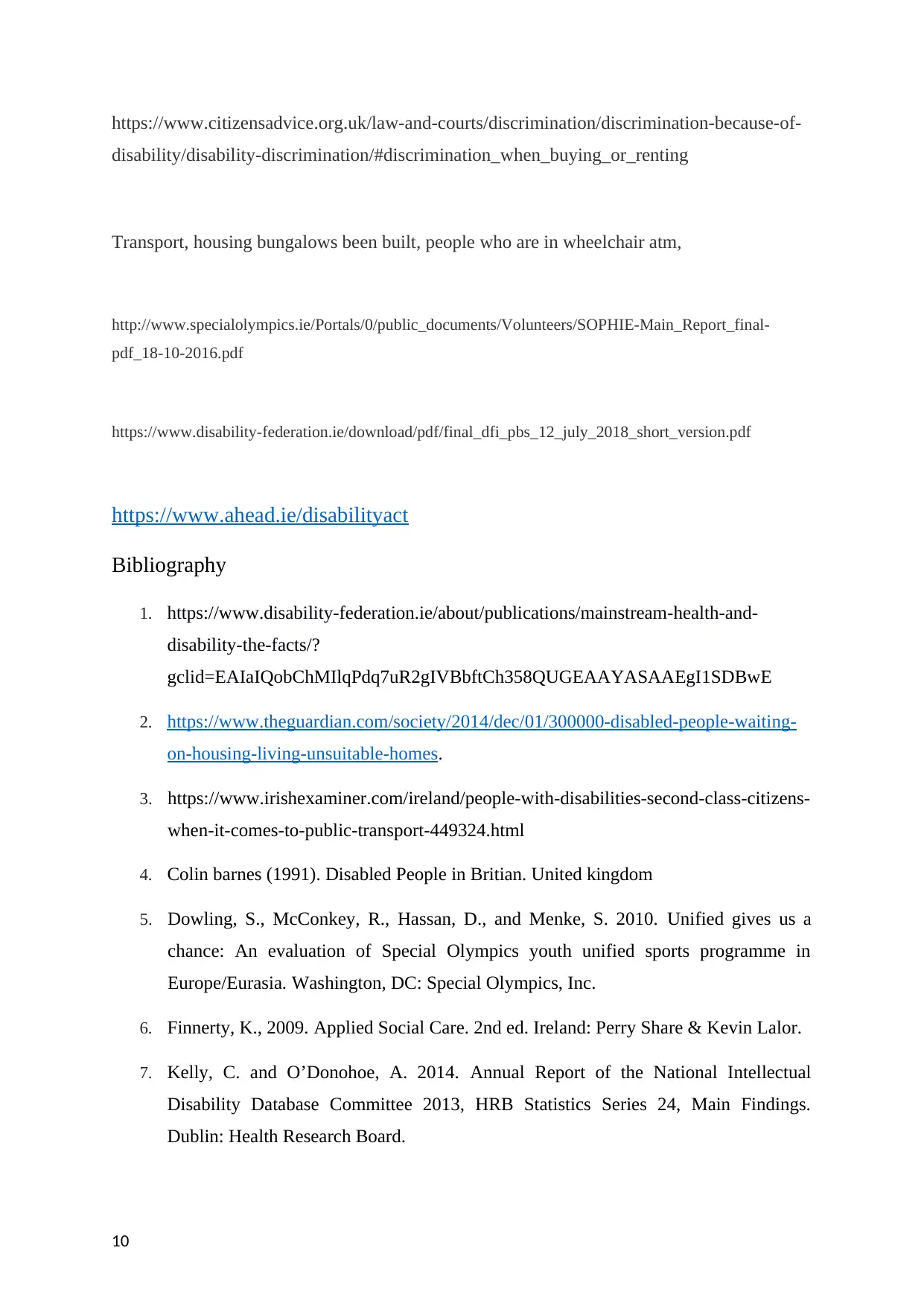
https://www.citizensadvice.org.uk/law-and-courts/discrimination/discrimination-because-of-
disability/disability-discrimination/#discrimination_when_buying_or_renting
Transport, housing bungalows been built, people who are in wheelchair atm,
http://www.specialolympics.ie/Portals/0/public_documents/Volunteers/SOPHIE-Main_Report_final-
pdf_18-10-2016.pdf
https://www.disability-federation.ie/download/pdf/final_dfi_pbs_12_july_2018_short_version.pdf
https://www.ahead.ie/disabilityact
Bibliography
1. https://www.disability-federation.ie/about/publications/mainstream-health-and-
disability-the-facts/?
gclid=EAIaIQobChMIlqPdq7uR2gIVBbftCh358QUGEAAYASAAEgI1SDBwE
2. https://www.theguardian.com/society/2014/dec/01/300000-disabled-people-waiting-
on-housing-living-unsuitable-homes.
3. https://www.irishexaminer.com/ireland/people-with-disabilities-second-class-citizens-
when-it-comes-to-public-transport-449324.html
4. Colin barnes (1991). Disabled People in Britian. United kingdom
5. Dowling, S., McConkey, R., Hassan, D., and Menke, S. 2010. Unified gives us a
chance: An evaluation of Special Olympics youth unified sports programme in
Europe/Eurasia. Washington, DC: Special Olympics, Inc.
6. Finnerty, K., 2009. Applied Social Care. 2nd ed. Ireland: Perry Share & Kevin Lalor.
7. Kelly, C. and O’Donohoe, A. 2014. Annual Report of the National Intellectual
Disability Database Committee 2013, HRB Statistics Series 24, Main Findings.
Dublin: Health Research Board.
10
disability/disability-discrimination/#discrimination_when_buying_or_renting
Transport, housing bungalows been built, people who are in wheelchair atm,
http://www.specialolympics.ie/Portals/0/public_documents/Volunteers/SOPHIE-Main_Report_final-
pdf_18-10-2016.pdf
https://www.disability-federation.ie/download/pdf/final_dfi_pbs_12_july_2018_short_version.pdf
https://www.ahead.ie/disabilityact
Bibliography
1. https://www.disability-federation.ie/about/publications/mainstream-health-and-
disability-the-facts/?
gclid=EAIaIQobChMIlqPdq7uR2gIVBbftCh358QUGEAAYASAAEgI1SDBwE
2. https://www.theguardian.com/society/2014/dec/01/300000-disabled-people-waiting-
on-housing-living-unsuitable-homes.
3. https://www.irishexaminer.com/ireland/people-with-disabilities-second-class-citizens-
when-it-comes-to-public-transport-449324.html
4. Colin barnes (1991). Disabled People in Britian. United kingdom
5. Dowling, S., McConkey, R., Hassan, D., and Menke, S. 2010. Unified gives us a
chance: An evaluation of Special Olympics youth unified sports programme in
Europe/Eurasia. Washington, DC: Special Olympics, Inc.
6. Finnerty, K., 2009. Applied Social Care. 2nd ed. Ireland: Perry Share & Kevin Lalor.
7. Kelly, C. and O’Donohoe, A. 2014. Annual Report of the National Intellectual
Disability Database Committee 2013, HRB Statistics Series 24, Main Findings.
Dublin: Health Research Board.
10
Paraphrase This Document
Need a fresh take? Get an instant paraphrase of this document with our AI Paraphraser

11
1 out of 11
Related Documents
Your All-in-One AI-Powered Toolkit for Academic Success.
+13062052269
info@desklib.com
Available 24*7 on WhatsApp / Email
![[object Object]](/_next/static/media/star-bottom.7253800d.svg)
Unlock your academic potential
Copyright © 2020–2026 A2Z Services. All Rights Reserved. Developed and managed by ZUCOL.





